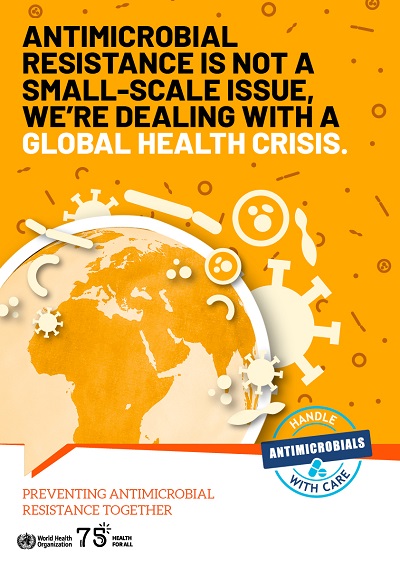World Antimicrobial Resistance Awareness Week (World AMR Awareness Week) 2023
Message of WHO Regional Director for Africa, Dr Matshidiso Moeti
Resistance to commonly used antimicrobials, including antibiotics, is a global health challenge that poses grave risks to the public.
Antimicrobial resistance (AMR) occurs when disease-causing germs stop responding to frequently prescribed antimicrobial medicines. It jeopardizes our ability to treat common infections, increases the cost of treatment, and disrupts the progress we have made in combating diseases, posing a grave challenge to our communities, health systems, and economies.
Every year, the international community observes World AMR Awareness Week from 18 to 24 November to raise awareness of the risks posed by the inappropriate use of antimicrobial medicines in humans, animals, and crops and encourage their responsible use to reduce the emergence and spread of AMR.
This year’s theme, “Preventing Antimicrobial Resistance Together,” calls for urgent multisectoral action in the context of the One Health approach to preserve the efficacy of antimicrobial medicines.
Antimicrobial-resistant infections caused 1.27 million deaths globally in 2019, more than HIV/AIDS and malaria combined. Sub-Saharan African countries bear the highest burden of AMR-associated death rates at 99 deaths per 100 000 people.
We need to take urgent action and address the main causes of AMR, which include misuse and abuse of antimicrobial medicines, lack of access to clean water, sanitation and hygiene; poor infection prevention and control practices; inadequate use of vaccines to decrease infections; inadequate laboratory capacity including equipment and reagents to guide proper treatment; poor waste disposal practices; and the presence of antimicrobials in food-animal production and crop protection as well as the environment and water bodies.
The capacity to generate evidence and demonstrate the burden, guide resource mobilization, and summon political commitment is topical. Currently, 38 of our Member States have enrolled in the global antimicrobial resistance (AMR) and use surveillance systems; the evidence generated has informed decision-making and amendment of policies in 17 countries. In Ghana, the integrated surveillance under the One Health approach has highlighted the interrelatedness with resistant bacteria spreading from the environment to the food chain and causing human infections, and vice-versa.
Efforts are ongoing to optimize antimicrobial use in our healthcare facilities through integrated antimicrobial stewardship (AMS) programs. A standard Regional AMS Training Package developed and piloted in DRC, Ghana, Nigeria, and Zambia has been used to train multidisciplinary teams of over 70 health personnel from these four countries, implementing practical, cost-effective, and sustainable antimicrobial stewardship programs in healthcare facilities.
As we mark the 2023 World AMR Week, WHO-AFRO joins hands with FAO, UNEP, Africa CDC, the World Organisation for Animal Health, and the African Union Inter-African Bureau for Animal Resources, in a continental appeal for increased political advocacy to highlight the gravity of the threat of AMR.
In line with the regional strategy for expanding the implementation and monitoring of the national action plans on AMR, I would like to take this opportunity to reiterate our “call to action” addressed to our Member States:
- Increase and sustain domestic funding to implement AMR National Action Plans focused on infection prevention and control, clean water, sanitation, and hygiene in our communities, as well as establishing multisectoral coordination mechanisms to counter the risks.
- Support the building of resilient health systems by maintaining the critical balance between addressing AMR and maintaining access to vital medicines.
- Strengthen surveillance and laboratory capacity for prevention, detection and response to AMR through existing global and regional strategies, policies and guidelines.
- Ensure nationwide targeted AMR awareness campaigns involving various sectors to promote capacity building of professionals on AMR and behavioral change of health workers and community.
- Strengthen collaboration among stakeholders, which is key to success in combating AMR. African countries must unite to implement tailored national action plans, share best practices, and coordinate efforts to strengthen antimicrobial stewardship. We must collaborate with international partners, civil society organizations, and the private sector to leverage resources, knowledge, and expertise.
We all have a role in containing this global threat by improving our health-seeking behaviour, seeking professional advice in the event of illness, and ensuring that any prescribed treatment courses are completed.
Let us seize this opportunity during World Antimicrobial Resistance Awareness Week to reaffirm our commitment to addressing AMR together.


